Daily Vocabulary Words: List of Daily Used Words in Leading International Newspapers
Hi there. Welcome to this special section @ Wordpandit.
Our endeavour here is very simple: to highlight important daily vocabulary words, which you would come across in leading newspapers in the country. We have included the following newspapers in our selection:
• The New York Times
• The Washington Post
• Scientific American
• BBC
• The Guardian
• Psychology Today
• Wall Street Journal
• The Economist
We are putting in extensive work for developing your vocabulary. All you have got to do is be regular with this section and check out this post on a daily basis. This is your repository of words that are commonly used and essentially, we are posting a list of daily used words. Hence, this has significant practical application as it teaches you words that are used commonly in leading publications mentioned above.
Visit the website daily to learn words from leading international newspapers.
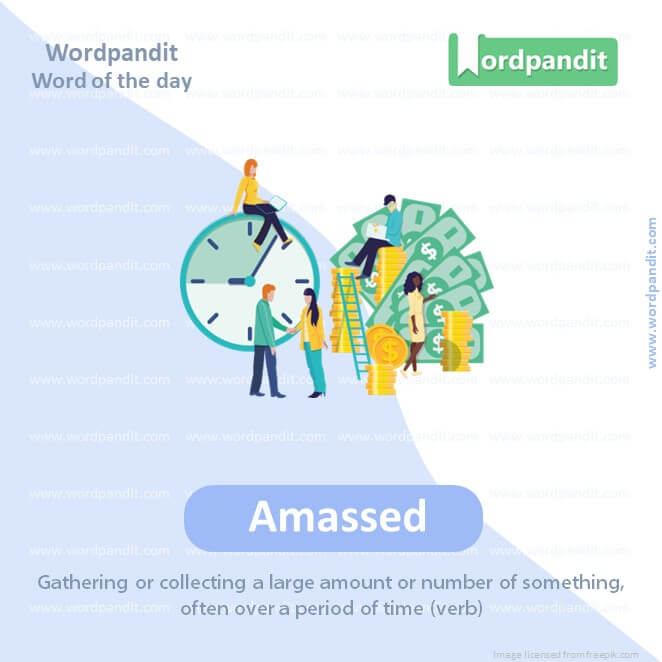
WORD-1: Amassed
CONTEXT: That’s especially important with Mr. Xi, who, in his third term, has amassed vastly more power.
SOURCE: Washington Post
EXPLANATORY PARAGRAPH: Imagine you have a big pile of your favorite toys. You keep adding more toys to it until it becomes a really big collection. That’s like ‘amassed’. It means gathering a lot of something in one place.
MEANING: Gathering or collecting a large amount or number of something, often over a period of time (verb).
PRONUNCIATION: uh-MASS-t
SYNONYMS: Collected, Accumulated, Gathered, Hoarded, Piled, Stockpiled.
USAGE EXAMPLES:
1. She amassed a huge collection of stamps.
2. Over the years, he amassed a lot of knowledge about cars.
3. The charity amassed thousands of dollars in donations.
4. Leaves had amassed in the corner of the yard.
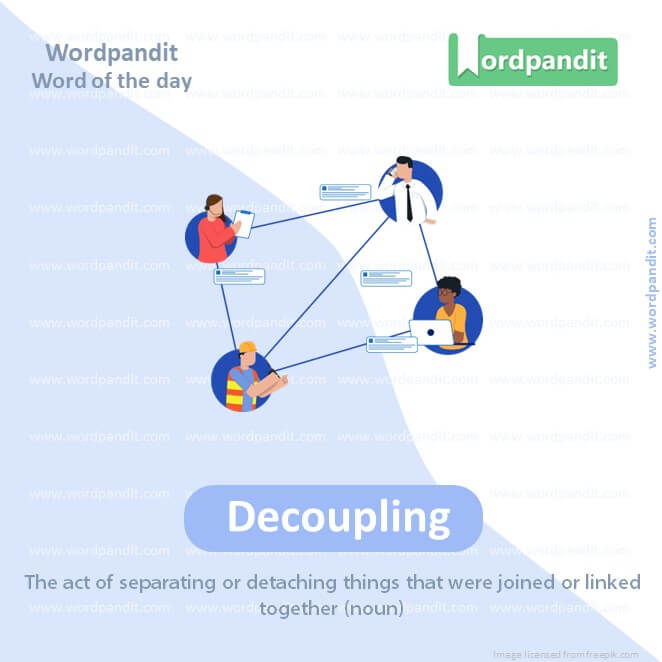
WORD-2: Decoupling
CONTEXT: Mr. Biden eschewed the notion of decoupling the U.S. and Chinese economies.
SOURCE: Al Jazeera
EXPLANATORY PARAGRAPH: Think about two train cars hooked together. If they are separated, we say they are ‘decoupled’. It’s like taking apart two things that were connected.
MEANING: The act of separating or detaching things that were joined or linked together (noun).
PRONUNCIATION: dee-KUHP-ling
SYNONYMS: Disconnecting, Detaching, Separating, Disengaging, Unlinking, Unfastening.
USAGE EXAMPLES:
1. The decoupling of the two companies led to significant changes.
2. There’s a need for decoupling the trailer from the truck.
3. Decoupling the device from its power source is necessary.
4. Economic decoupling between countries can have big impacts.
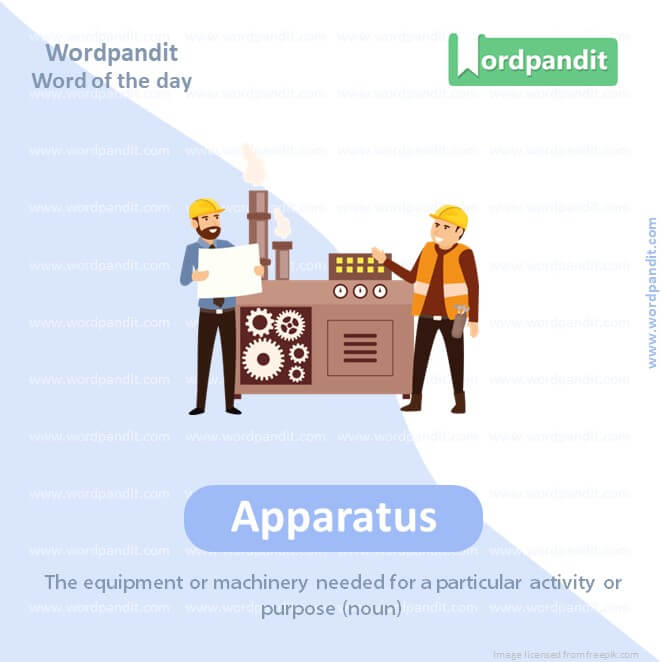
WORD-3: Apparatus
CONTEXT: China’s military and security apparatus is blocked from access to the United States’ most sensitive technology and that American consumers are not buying products linked to forced labor.
SOURCE: The Guardian
EXPLANATORY PARAGRAPH: Apparatus is like a set of tools or equipment for a specific purpose. Think of a firefighter’s gear or a doctor’s tools – these are kinds of apparatus.
MEANING: The equipment or machinery needed for a particular activity or purpose (noun).
PRONUNCIATION: ap-uh-RAT-us
SYNONYMS: Equipment, Gear, Machinery, Device, Instrument, Setup.
USAGE EXAMPLES:
1. The laboratory was filled with scientific apparatus.
2. They used a special apparatus for the experiment.
3. The fire brigade arrived with their apparatus.
4. He checked the apparatus to ensure it was working properly.
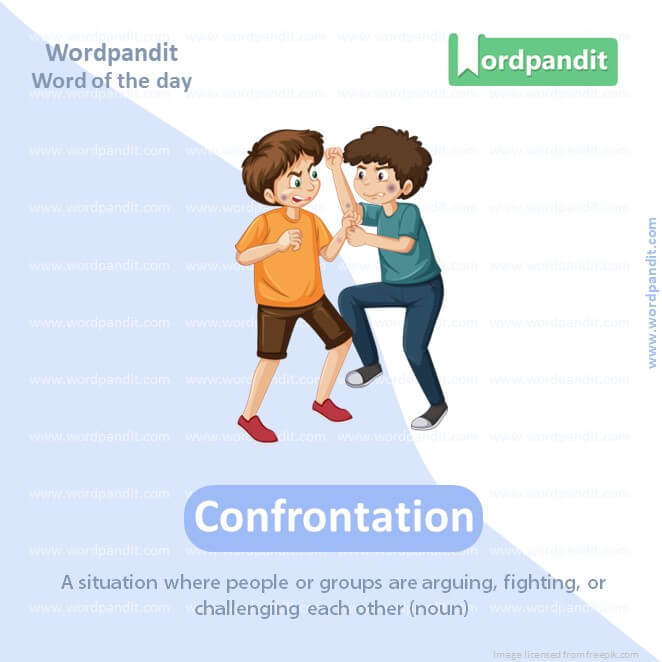
WORD-4: Confrontation
CONTEXT: they must is better policy than disengagement or, worse, outright confrontation.
SOURCE: Washington Post
EXPLANATORY PARAGRAPH: Confrontation is like when you and your friend argue because you disagree on something. It’s when people face each other in an argument or a challenge.
MEANING: A situation where people or groups are arguing, fighting, or challenging each other (noun).
PRONUNCIATION: kon-fruhn-TAY-shuhn
SYNONYMS: Conflict, Clash, Dispute, Altercation, Face-off, Showdown.
USAGE EXAMPLES:
1. The confrontation between the two teams was intense.
2. They avoided confrontation by talking calmly.
3. The debate led to a confrontation among the participants.
4. There was a confrontation at the meeting over the new policy.
WORD-5: Menacing
CONTEXT: when the Soviets were more menacing than China is now.
SOURCE: Washington Post
EXPLANATORY PARAGRAPH: Menacing is like when something or someone seems scary or like they might cause harm. Imagine a dark, cloudy sky that looks like it might bring a big storm.
MEANING: Suggesting the presence of danger; threatening or scary (adjective).
PRONUNCIATION: MEN-uh-sing
SYNONYMS: Threatening, Intimidating, Frightening, Ominous, Foreboding, Alarming.
USAGE EXAMPLES:
1. The dog had a menacing look in its eyes.
2. Dark clouds gave the sky a menacing appearance.
3. The character in the movie had a menacing voice.
4. The silence in the forest was menacing.
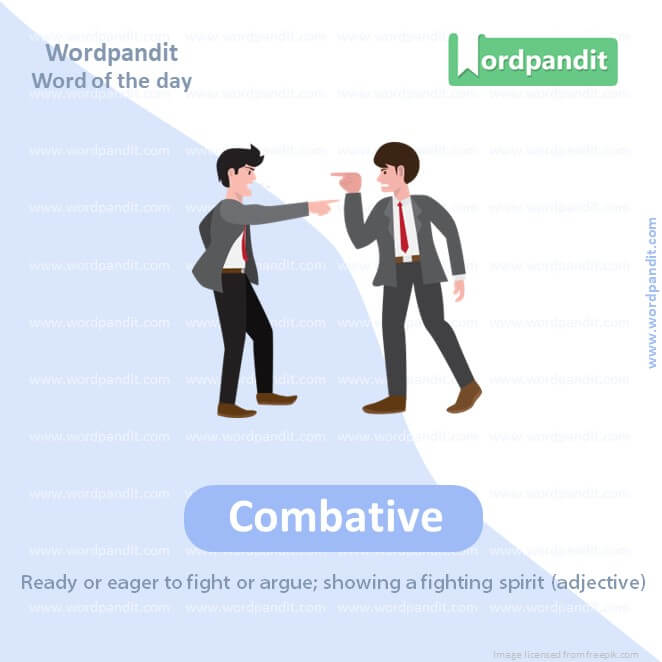
WORD-6: Combative
CONTEXT: Mr. Xi, who lately has struck a more conciliatory tone after years of combative rhetoric.
SOURCE: Washington Post
EXPLANATORY PARAGRAPH: Combative is like when someone is ready to fight or argue. Think about a superhero who is always ready to battle the bad guys.
MEANING: Ready or eager to fight or argue; showing a fighting spirit (adjective).
PRONUNCIATION: KOM-buh-tiv
SYNONYMS: Aggressive, Belligerent, Pugnacious, Quarrelsome, Militant, Confrontational.
USAGE EXAMPLES:
1. His combative attitude made it hard to discuss peacefully.
2. The debate became very combative.
3. She took a combative stance on the issue.
4. The meeting was marked by combative exchanges.
WORD-7: Conciliatory
CONTEXT: Mr. Xi, who lately has struck a more conciliatory tone after years of combative rhetoric.
SOURCE: The Guardian
EXPLANATORY PARAGRAPH: Conciliatory is like when you try to make peace after a fight. It’s like saying sorry or trying to make things better so everyone gets along.
MEANING: Intended or likely to placate or pacify; showing willingness to reconcile (adjective).
PRONUNCIATION: kuhn-SIL-ee-uh-tor-ee
SYNONYMS: Peacemaking, Placating, Pacifying, Appeasing, Soothing, Mollifying.
USAGE EXAMPLES:
1. Her conciliatory approach helped resolve the conflict.
2. He made a conciliatory gesture to his opponent.
3. The manager’s conciliatory words calmed the angry customer.
4. A conciliatory tone can often lead to better understanding.
WORD-8: Bolstering
CONTEXT: government is bolstering inefficient state companies while restricting private enterprises.
SOURCE: The Guardian
EXPLANATORY PARAGRAPH: Bolstering is like when you help to make something stronger or better. It’s like adding more pillows to make your fort stronger.
MEANING: Supporting or strengthening; giving more support to something (verb).
PRONUNCIATION: BOL-stur-ing
SYNONYMS: Supporting, Reinforcing, Strengthening, Fortifying, Boosting, Enhancing.
USAGE EXAMPLES:
1. They were bolstering the defenses of the city.
2. Bolstering his argument with facts helped him win the debate.
3. She was bolstering her resume with new skills.
4. Bolstering the team’s morale was crucial for their success.
WORD-9: Bastion
CONTEXT: a bastion of freedom off China’s coast that Beijing claims is a breakaway province.
SOURCE: Washington Post
EXPLANATORY PARAGRAPH: Bastion is like a strong castle or fort that protects people. It’s a place or thing that is a source of strength or safety.
MEANING: A strong defense or fort, or something seen as a source of protection (noun).
PRONUNCIATION: BAS-chun
SYNONYMS: Fortress, Stronghold, Bulwark, Citadel, Fortification, Rampart.
USAGE EXAMPLES:
1. The old castle was a bastion against invaders.
2. She was a bastion of support for her friends.
3. The library was a bastion of knowledge in the community.
4. Their home was a bastion of peace and tranquility.
WORD-10: Maneuvers
CONTEXT: China has been ramping up its military maneuvers in the Taiwan Strait to try to influence the outcome.
SOURCE: Washington Post
EXPLANATORY PARAGRAPH: Maneuvers are like special moves or plans you make to do something well. It’s like when you carefully move your pieces in a board game to win.
MEANING: Carefully planned movements or actions, especially in a military or skilled context (noun).
PRONUNCIATION: muh-NOO-vurz
SYNONYMS: Movements, Operations, Tactics, Strategies, Exercises, Actions.
USAGE EXAMPLES:
1. The troops practiced military maneuvers in the field.
2. He executed a series of maneuvers to win the game.
3. The driver performed skilled maneuvers to avoid the obstacle.
4. The company’s business maneuvers helped it stay ahead.
vocabulary NDA
Understanding the Vocabulary NDA (Non-disclosure Agreement) is a crucial step in the world of business and law. These terms are not just a compilation of complex words, but a key to decoding legal implications that could affect your business.
Essentially, the Vocabulary NDA refers to the specific set of terms and phrases typically present in a non-disclosure agreement. Broadening your knowledge on this could significantly enhance your comprehension, allowing you to navigate the legal landscape more smoothly.
Mastering the vocabulary NDA starts by contextualizing. While it may sound highly technical, relating each term to real-world scenarios greatly facilitates one’s learning process. Realize that the words in the vocabulary NDA are not arbitrary; they align with certain legal concepts, circumstances, and proceedings.
Secondly, repetition plays an integral role. Regular exposure to the vocabulary NDA strengthens one’s memory, promoting the retention of information. Consider engaging in relevant discussions, reading articles, listening to podcasts, or even simply reviewing a non-disclosure agreement. This repetitive interaction ultimately ingrains the vocabulary NDA into one’s cognitive system.
The vocabulary NDA becomes less intimidating through practical application. It’s essential to apply these terms in actual situations – be it drafting your own NDA, or merely examining an existing one. This invites an in-depth understanding, making the vocabulary NDA more familiar and comprehensible.
Lastly, remember to continuously expand and refine the vocabulary NDA. Legal terminologies evolve, and so should your lexical prowess. Stay updated with new terms and modifications in law that could modify the existing vocabulary NDA.
To sum it up, learning the vocabulary NDA requires relatability, repetition, practical application, and continuous learning. Leverage these strategies, and break your barriers to legal fluency. Unfurl the complexities of the vocabulary NDA, for it’s a secret tool in your success arsenal.











